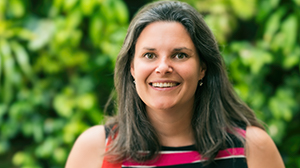

I didn't realize how innovative we were until we saw it through the lens of other parts of the world.
Experiential learning is increasingly becoming a priority of post-secondary institutions across the globe. After presenting at a conference in Croatia recently, the University of Guelph-Humber's Dr. Nikki Martyn and Leah Murdock found that schools around the world could learn from UofGH's established approach to providing these experiential learning opportunities and allowing students to apply the lessons of the classroom in real-world settings.
Dr. Martyn, Program Head of Early Childhood Studies, and Murdock, Department Head of Student Services, travelled to the 8th Annual Global Business Conference in Dubrovnik to present on experiential learning and the way traditional methods of higher education are being rapidly transformed.
“The traditional university education in which students learn from being lectured to is not effective for this generation of students,” Dr. Martyn explained. “Higher education is evolving around the world. The expectations of university education today are linked to employment upon graduation.
“The impact on teaching and learning in this new higher education framework is complex.”
The research process informing the presentation found Dr. Martyn and Murdock exploring in-depth the experiential learning opportunities offered here by carefully combing through course outlines for all of UofGH’s academic offerings.
Ultimately, they found significant experiential learning opportunities offered across all seven programs at the University of Guelph-Humber, where every student participates in a work placement or internship ranging from 100 to 850-plus hours. Further, Murdock and Dr. Martyn found examples of high-impact and experiential learning in the classroom, while also noting the value in the collaborative community connections encouraged through many UofGH programs and partnerships.
“The University of Guelph-Humber was founded on that principle,” Dr. Martyn said. “This is something we excel at.”
One encouraging takeaway from the conference was observing how institutions from the United States, Europe and around the world are still in the earliest stages of incorporating some of these experiential learning practices that have long been integral to UofGH.
“We saw at this global conference that we are really at the forefront,” Dr. Martyn said. “We were able to share our experiences with people who hadn’t even conceived yet of things we are already implementing, like our Co-Curricular Record. It really gave us the sense that we are quite cutting edge in terms of the amount of placements, how we conduct them, and how we work with community partners.
“I didn't realize how innovative we were until we saw it through the lens of other parts of the world.”
For some in higher education, the shift toward experiential learning represents a challenging change, but embracing the evolution of these teaching philosophies is crucial to connecting with current and future generations of students.
“We need to push our boundaries,” Dr. Martyn said. “We need to learn by doing, because we know the current generation of students needs that; that’s how they understand the world. They need to research, they need to engage through media, and they need to keep active.
“There’s a need for post-secondary education to keep up with the times, but higher education can generally be slow to adapt. Because the University of Guelph-Humber is relatively young and nimble, we can jump on things and grow, evolve and innovate a little more quickly.”







